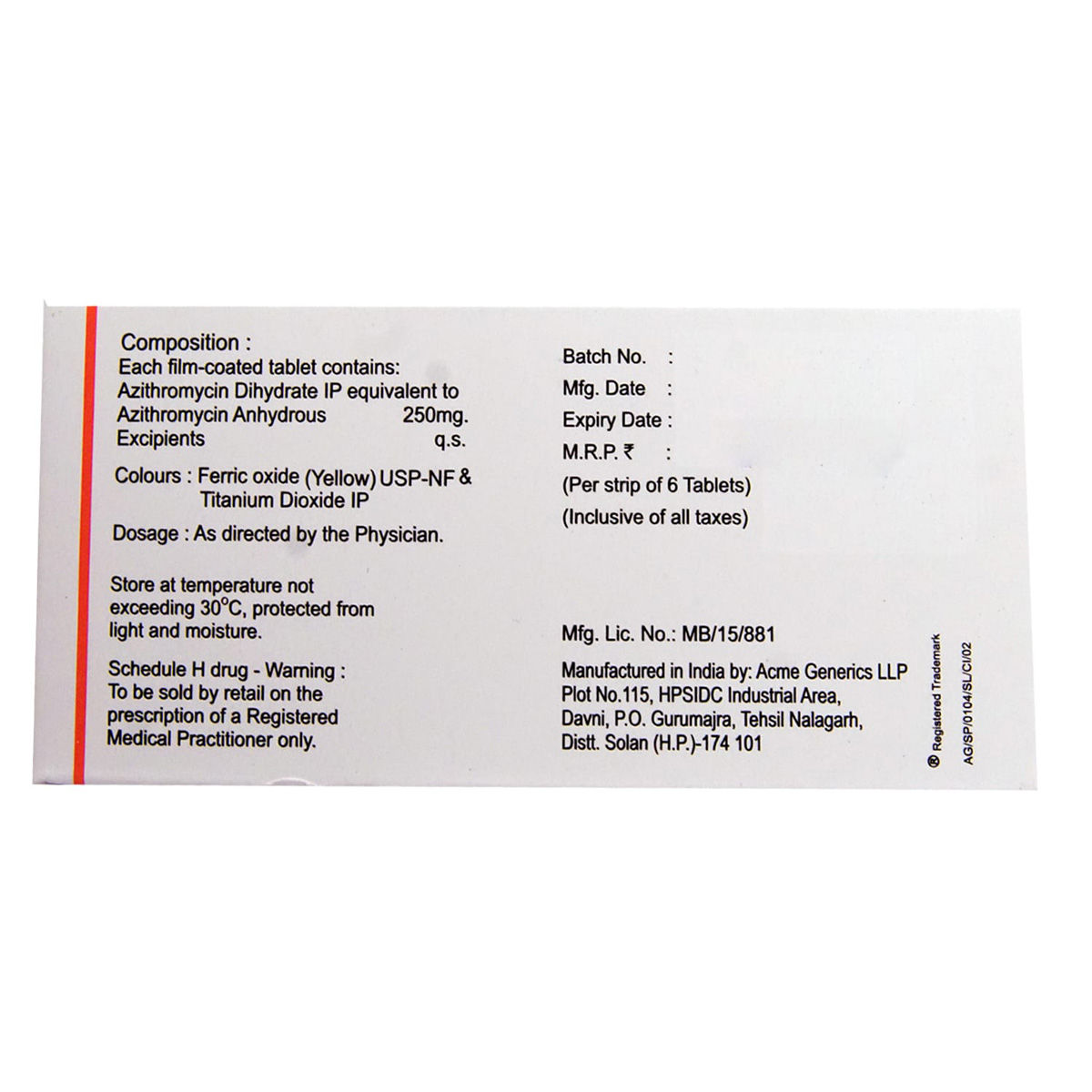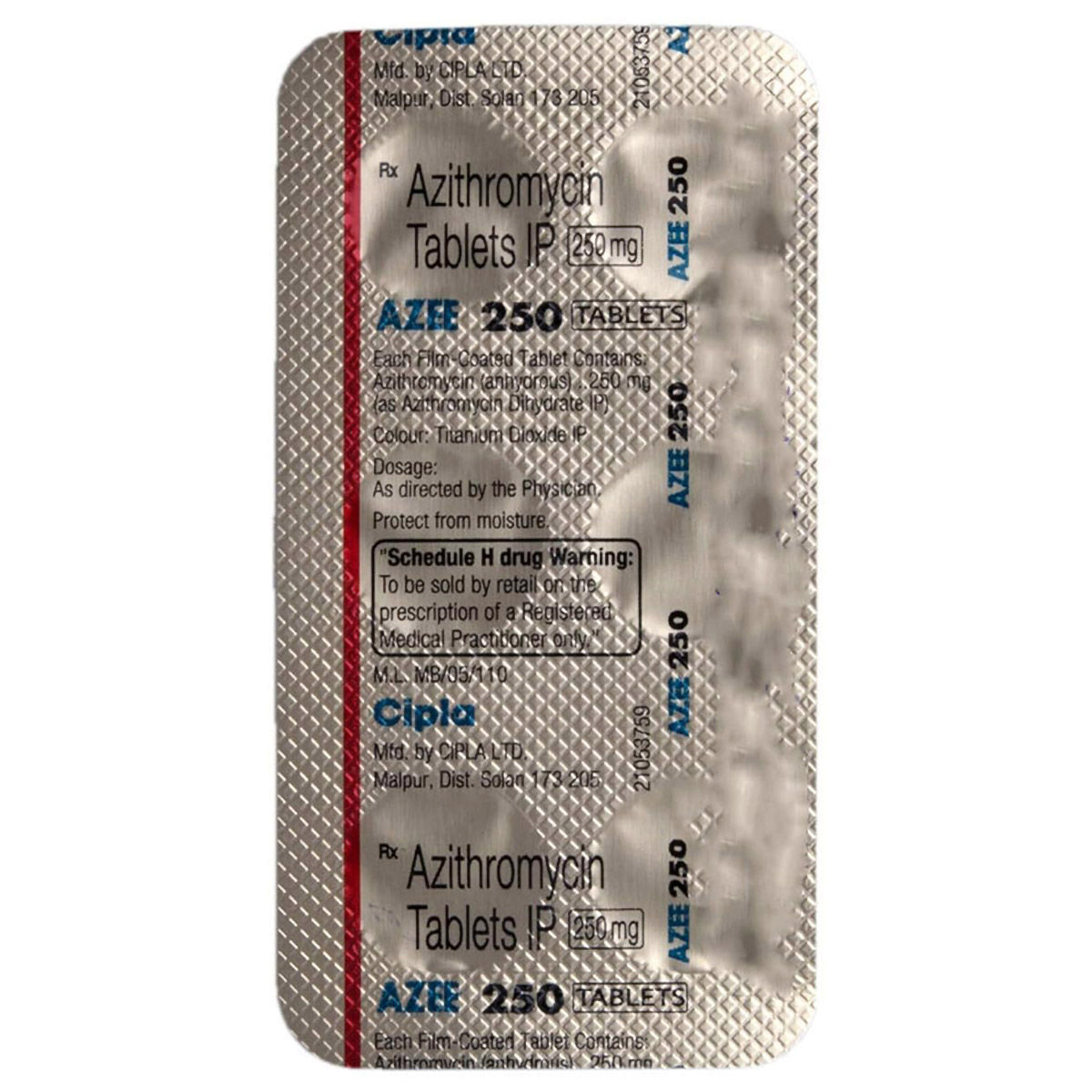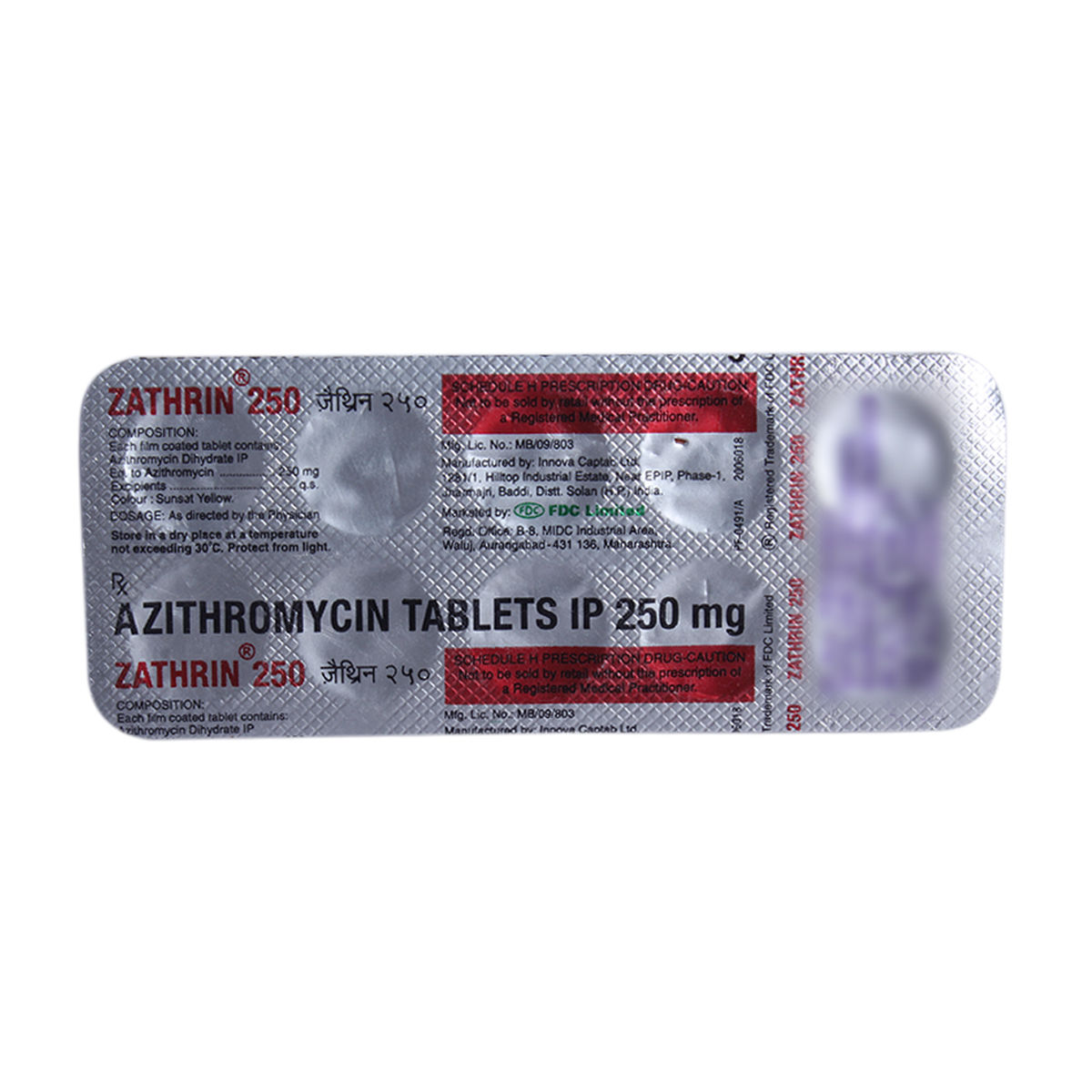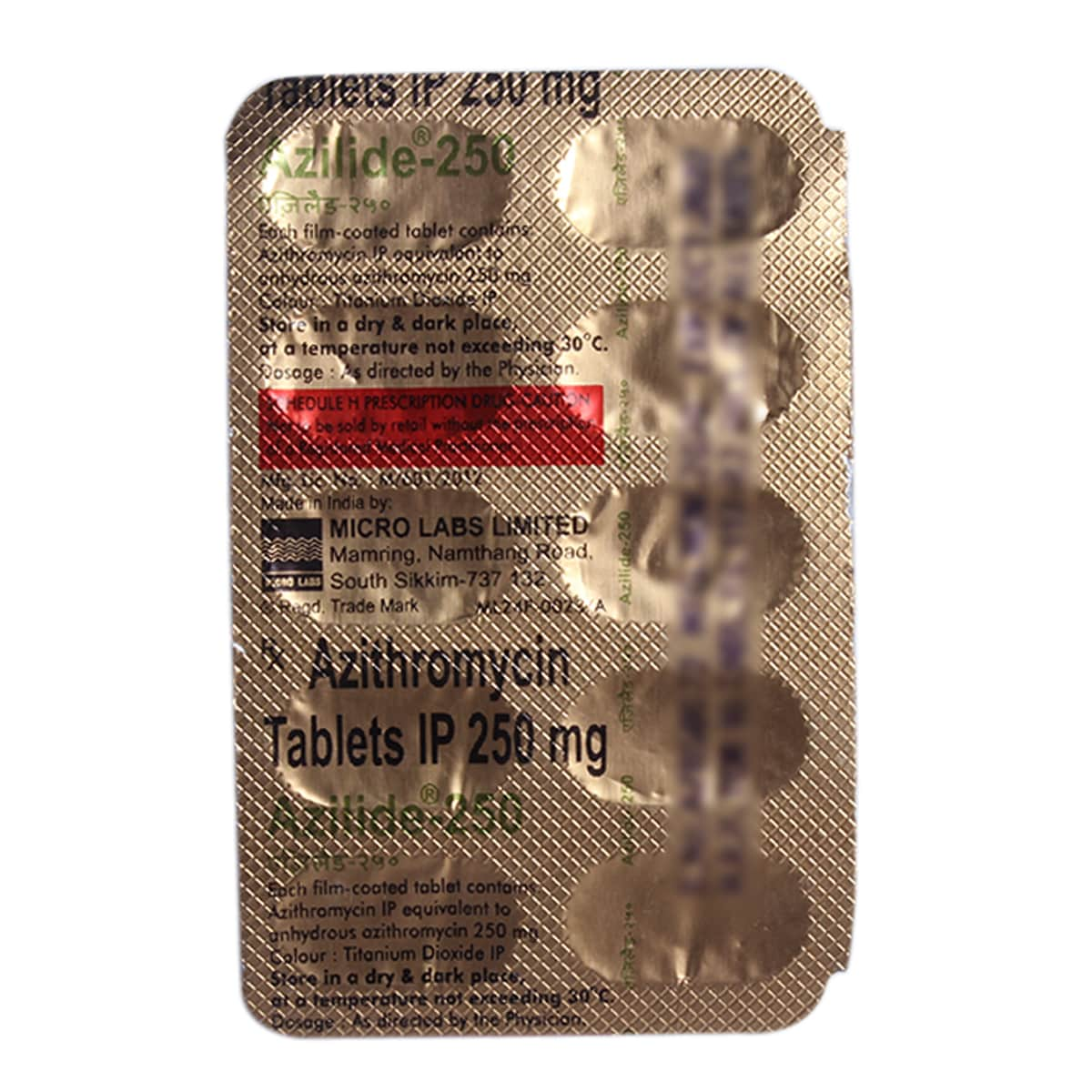Azifine Plus 250 Tablet 10's
₹117*
MRP ₹130
10% off
₹110.5*
MRP ₹130
15% CB
₹19.5 cashback(15%)
Free Delivery
With Circle membership
(Inclusive of all Taxes)
This offer price is valid on orders above ₹800. Apply coupon PHARMA10/PHARMA18 (excluding restricted items)
Know Your Delivery Time
Provide Delivery Location


Available Offers
Whats That

Secure Payment

India's Most Trusted Pharmacy

Genuine Products
Composition :
Manufacturer/Marketer :
Consume Type :
Return Policy :
Expires on or after :
About Azifine Plus 250 Tablet
Azifine Plus 250 Tablet is an antibiotic. It is used to treat various bacterial infections such as respiratory system (like pneumonia, bronchitis, tonsillitis, pharyngitis and sinusitis), skin infections (like acne and rosacea), ear infections, and sexually transmitted infections. A bacterial infection is a condition in which bacteria grow in the body and cause infection. It can target any body part and multiple very quickly.
Azifine Plus 250 Tablet slows the growth or sometimes kills the harmful bacteria by preventing the production of proteins required by the bacteria for its survival. Azifine Plus 250 Tablet does not treat a viral infection like flu or a common cold.
Azifine Plus 250 Tablet should only be taken if advised by your doctor. It can be taken with or without food but should be consumed at a fixed time for the best results. Azifine Plus 250 Tablet should not be consumed more than the recommended dose, to avoid unpleasant side effects. Also, the course should be completed even if you feel better, as it is an antibiotic. Some common side effects of Azifine Plus 250 Tablet are diarrhoea, nausea, vomiting, and indigestion. An allergic reaction such as rashes, itching, swelling, and shortness of breath can occur in rare cases. Please consult your doctor if an allergic reaction becomes severe.
Tell your doctor if you have liver problems, muscle problems (myasthenia gravis), heart rhythm disorder (arrhythmia), or electrolyte imbalance (low potassium or magnesium level). You should consult a doctor if you have had diarrhoea for more than four days. However, do not take any anti-diarrheal medicine until your doctor tells you. It is unknown whether Azifine Plus 250 Tablet harms the baby or passes into breast milk during pregnancy and breastfeeding. Contacting a doctor before using Azifine Plus 250 Tablet during pregnancy and while breastfeeding is better. Avoid too much exposure to sunlight as Azifine Plus 250 Tablet can make your skin sensitive to sunburn. In this case, it is advisable to wear protective clothing or apply sunscreen (SPF 30 or higher) when you are outdoors.
Uses of Azifine Plus 250 Tablet
Directions for Use
Medicinal Benefits
Azifine Plus 250 Tablet slows the growth or sometimes kills the harmful bacteria by preventing the production of proteins required by the bacteria for its survival. It prevents and treats bacterial infections like throat and sinus infections, chest infections (like bronchitis and pneumonia), ear infections, mouth and dental infections, eye infections, skin and tissue infections (like acne), and stomach and intestinal infections. It is better tolerated and has more effective tissue penetration than other similar antibiotics like erythromycin. Doctors prescribe Azifine Plus 250 Tablet for people who are intolerant to penicillin antibiotics. Besides this, it also helps prevent infection following burns, surgery or dental procedures, sexually transmitted infections, bone infections or scarlet fever (bacterial illness with strep throat).
How Azifine Plus 250 Tablet Works
Storage
Side Effects of Azifine Plus 250 Tablet
Diarrhoea
Feeling or being sick (nausea or vomiting)
Stomach cramps
Loss of appetite
Bloating
Indigestion
What if I have taken an overdose of Azifine Plus 250 Tablet
Drug Warnings
Tell your doctor if you have liver problems (jaundice), muscle problems (myasthenia gravis), heart rhythm disorder (arrhythmia), or electrolyte imbalance (low potassium or magnesium level). In rare cases, the use of Azifine Plus 250 Tablet can cause diarrhoea, so if you have watery or bloody diarrhoea, stop taking Azifine Plus 250 Tablet and call your doctor. However, do not take any anti-diarrheal medicine until your doctor tells you. It is unknown whether Azifine Plus 250 Tablet harms the baby during pregnancy. Consult your doctor if you are pregnant, planning for pregnancy or breastfeeding before using Azifine Plus 250 Tablet . Do not take Azifine Plus 250 Tablet if allergic to azithromycin or other macrolide antibiotics. Inform the doctor if you are using cholesterol-lowering drugs (statins like simvastatin, lovastatin etc.), anti-gout or anti-arthritis drugs (colchicine) and medicine for treating overactive bladder (tolterodine). Azifine Plus 250 Tablet is not recommended for the patients with pneumonia who are judged to be inappropriate for oral therapy due to moderate to severe illness or risk factors.
Drug-Drug Interactions
Drug-Drug Interactions
Login/Sign Up
Co-administration of Azifine Plus 250 Tablet 10's with Ziprasidone can increase the risk of irregular heart rhythm.
How to manage the interaction:
Although there is an interaction between Ziprasidone and Azifine Plus 250 Tablet 10's but can be taken together if prescribed by a doctor. Contact a doctor immediately if you experience sudden dizziness, lightheadedness, fainting, shortness of breath. Do not discontinue any medications without consulting a doctor.
Taking Azifine Plus 250 Tablet 10's with fingolimod increases the risk of an abnormal heart rhythm.
How to manage the interaction:
Though administration of Azifine Plus 250 Tablet 10's alongside fingolimod can result in an interaction, it can be taken if a doctor has advised it. However, if you experience sudden dizziness, lightheadedness, fainting, breathing difficulty, or rapid heartbeat, consult the doctor immediately. Do not stop any medications without a doctor's advice.
Teriflunomide can cause liver issues, and combining it with Azifine Plus 250 Tablet 10's, can raise the risk.
How to manage the interaction:
Although administration of Azifine Plus 250 Tablet 10's alongside teriflunomide can result in an interaction, it can be taken if a doctor has advised it. However, if you notice fever, chills, joint pain or swelling, unusual bleeding or bruising, skin rash, itching, loss of appetite, fatigue, nausea, vomiting, abdominal pain, dark colored urine, light colored stools, and/or yellowing of the skin or eyes, contact a doctor right away. Do not discontinue any medications without consulting a doctor. Do not stop using any medications without talking to a doctor.
Taking amisulpride with Azifine Plus 250 Tablet 10's increases the risk of an abnormal heart rhythm.
How to manage the interaction:
Though using amisulpride and Azifine Plus 250 Tablet 10's together can result in an interaction, it can be taken if a doctor has advised it. However, if you experience abrupt dizziness, lightheadedness, fainting, shortness of breath, or heart palpitations, get medical treatment immediately. Do not discontinue any medications without consulting doctor.
Taking Azifine Plus 250 Tablet 10's with gatifloxacin may increase the risk of an abnormal heart rhythm.
How to manage the interaction:
Though administration of Azifine Plus 250 Tablet 10's alongside gatifloxacin can result in an interaction, it can be taken if a doctor has advised it. However, if you experience sudden dizziness, lightheadedness, fainting, breathing difficulty, or rapid heartbeat, consult the doctor immediately. Do not stop any medications without a doctor's advice.
Azifine Plus 250 Tablet 10's increases the levels of protamine in the blood, which may increase its effects.
How to manage the interaction:
Although taking Protamine and Azifine Plus 250 Tablet 10's together may cause an interaction, it can be taken if a doctor has suggested it. Do not discontinue any medications without consulting a doctor.
Taking Morphine with Azifine Plus 250 Tablet 10's may raise blood levels and side effects of morphine.
How to manage the interaction:
Although administration of Azifine Plus 250 Tablet 10's alongside morphine can result in an interaction, it can be taken if a doctor has advised it. However, if you experience dizziness, drowsiness, difficulty concentrating, and impairment in judgment, reaction speed and motor coordination contact a doctor. Do not discontinue any medications without consulting a doctor.
Taking Azifine Plus 250 Tablet 10's with efavirenz increases the risk of an abnormal heart rhythm.
How to manage the interaction:
Though administration of Azifine Plus 250 Tablet 10's alongside efavirenz can result in an interaction, it can be taken if a doctor has advised it. However, if you experience abrupt dizziness, lightheadedness, fainting, shortness of breath, or heart palpitations, get medical treatment immediately. Do not discontinue any medications without consulting a doctor.
Taking Azifine Plus 250 Tablet 10's with iloperidone increases the risk of an abnormal heart rhythm.
How to manage the interaction:
Though administration of Azifine Plus 250 Tablet 10's alongside iloperidone can result in an interaction, it can be taken if a doctor has advised it. However, if you experience sudden dizziness, lightheadedness, fainting, shortness of breath, or rapid heartbeat, get medical treatment immediately. Do not discontinue any medications without consulting a doctor.
Taking Azifine Plus 250 Tablet 10's with anagrelide may increase the risk of an abnormal heart rhythm. If you're dealing with other cardiac illnesses, electrolyte imbalances (for example, magnesium or potassium loss likely due to serious or prolonged diarrhoea or vomiting), you may be at greater risk.
How to manage the interaction:
Although using Azifine Plus 250 Tablet 10's and anagrelide together can possibly result in an interaction, it can be taken if your doctor has advised it. However, if you experience sudden dizziness, lightheadedness, fainting, breathing difficulty, or rapid heartbeat, consult the doctor immediately. Do not stop any medications without a doctor's advice.
Drug-Food Interactions
Drug-Food Interactions
Login/Sign Up
Diet & Lifestyle Advise
It would be best to take probiotics after taking the full course of Azifine Plus 250 Tablet to restore some healthy bacteria in the intestine that may have been killed. Taking probiotics after antibiotic treatment can reduce the risk of antibiotic-associated diarrhoea. Certain fermented foods like yoghurt, cheese, sauerkraut and kimchi can help restore the intestine's good bacteria.
Include more fibre-enriched food in your diet, as it can be easily digested by gut bacteria which helps stimulate their growth. Thus fibre foods may help restore healthy gut bacteria after taking a course of antibiotics. Whole grains like whole-grain bread, and brown rice, should be included in your diet.
Avoid taking too much calcium enriched foods and drinks as it might affect the working of Azifine Plus 250 Tablet .
Avoid intake of alcoholic beverages with Azifine Plus 250 Tablet as it can make you dehydrated and affect your sleep. This can make it harder for your body to aid the Azifine Plus 250 Tablet in fighting off infections.
Habit Forming
Therapeutic Class
Azifine Plus 250 Tablet Substitute

Aquris Azithcin 250 Tablet 6's
₹11.83per tabletAzee-250 Tablet 10's
by AYUR
₹13.00per tabletAzithral 250 Tablet 10's
₹11.70per tabletAzax 250 Tablet 6's
₹11.70per tabletAzithral 250 mg DT Tablet 5's
₹11.70per tablet
Product Substitutes
Alcohol
Safe if prescribed
Azifine Plus 250 Tablet should not be taken until prescribed if you are taking alcohol. Keep your doctor informed if you drink alcohol.
Pregnancy
Unsafe
There is insufficient information available about the use of Azifine Plus 250 Tablet during pregnancy. Therefore you should not use Azifine Plus 250 Tablet during pregnancy unless explicitly advised by your doctor.
Breast Feeding
Unsafe
Azifine Plus 250 Tablet is partially passed through the mother’s milk, therefore it should not be used if you are breastfeeding.
Driving
Safe if prescribed
There are no data available about the influence of Azifine Plus 250 Tablet on the ability to drive or operate machines. However, Azifine Plus 250 Tablet may cause dizziness and seizures so make sure you are not affected before driving or operating machinery.
Liver
Caution
You should tell your doctor if you have liver problems as your doctor may need to alter the normal dose.
Kidney
Caution
You should tell your doctor if you have kidney problems as your doctor may need to alter the normal dose.
Children
Caution
Safety and effectiveness in the treatment of patients under 6 months of age have not been established. So, it is not recommended for children less than 6 months of age. However, if the doctor has prescribed for the children more than 6 months Azifine Plus 250 Tablet can be used.
FAQs
Country of origin
Manufacturer/Marketer address
Disclaimer
Author Details
We provide you with authentic, trustworthy and relevant information
Reference
- https://www.medicines.org.uk/emc/files/pil.2276.pdf
- https://www.drugs.com/disease-interactions/azithromycin.html
- https://www.google.com/url?sa=t&rct=j&q=&esrc=s&source=web&cd=&ved=2ahUKEwjj17eE5PTsAhXCQ3wKHdPPBoIQFjABegQIAxAC&url=https%3A%2F%2Fwww.accessdata.fda.gov%2Fdrugsatfda_docs%2Flabel%2F2017%2F050710s44-050711s41-050784s28lbl.pdf&usg=AOvVaw3CifsQo7FLm9TbF0f4Ai9X
























